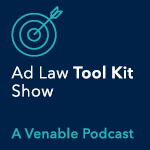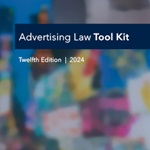Listen to Episode 8, "Social Media, Influencers, and Endorsements," and Episode 9, "Copyright Counseling and Protection," of Venable's Ad Law Tool Kit Show
 Advertisers increasingly view social media as an opportunity to have influencers speak positively about their products and services. But the Federal Trade Commission (FTC) has made it clear that rules regarding disclosure of material connections also apply in the social media context. In episode 8, host Shahin Rothermel and her guest, Venable partner Melissa Steinman, go over guidelines that include straightforward declarations like "X Company gave me a free product" or hashtags like #ad, emphasizing upfront, noticeable disclosures. Specific rules apply for different content formats, urging companies to monitor and educate employees and third-party implementers to prevent regulatory issues.
Advertisers increasingly view social media as an opportunity to have influencers speak positively about their products and services. But the Federal Trade Commission (FTC) has made it clear that rules regarding disclosure of material connections also apply in the social media context. In episode 8, host Shahin Rothermel and her guest, Venable partner Melissa Steinman, go over guidelines that include straightforward declarations like "X Company gave me a free product" or hashtags like #ad, emphasizing upfront, noticeable disclosures. Specific rules apply for different content formats, urging companies to monitor and educate employees and third-party implementers to prevent regulatory issues.
Maintaining a robust copyright portfolio is crucial for brand owners. Copyright is a universe almost as big as Marvel's, covering materials from ad copy to music and social media posts. In Episode 9, host Len Gordon and Venable partner Justin Pierce talk about how it's vital to secure ownership rights through agreements, clear third-party content, register copyrights, and have work-for-hire contracts. Staying updated on copyright trends and checking insurance coverage are essential for comprehensive copyright protection.
Payment Processing: An Excerpt from the Advertising Law Tool Kit
 Establishing a solid merchant processing relationship for the acceptance of card and other forms of payment for your sales is a key back-end function that no retailer should neglect. In addition to processing payments through the credit and debit card and automated clearing house (ACH) networks, payment processors can provide helpful analytical tools, dispute resolution, data security assistance, and other products or services related to payment processing.
Establishing a solid merchant processing relationship for the acceptance of card and other forms of payment for your sales is a key back-end function that no retailer should neglect. In addition to processing payments through the credit and debit card and automated clearing house (ACH) networks, payment processors can provide helpful analytical tools, dispute resolution, data security assistance, and other products or services related to payment processing.
The Power of Customer Calls: Maryland Supreme Court Upholds Public Service Commission's Interpretation of the Maryland Telephone Solicitations Act
Last month, the Supreme Court of Maryland delivered a pivotal ruling defining the scope of the Maryland Telephone Solicitations Act (MTSA), holding that the act extended to inbound calls initiated by consumers who engaged with merchant advertisements. The Maryland Supreme Court also confirmed that the Maryland Public Service Commission can enforce the MTSA against covered entities.
Event in Review: 10th Advertising Law Symposium
Venable's Advertising and Marketing Group hosted its 10th Advertising Law Symposium on March 21 in Washington, DC. The group welcomed in-house counsel, advertising executives, and marketing professionals for a full day of sessions on the latest developments in advertising law and what to watch for soon.
Fast VAST Update: Plaintiffs Allege Autorenewal Violations against Multilevel Marketing Company
Last week, a class action was filed in California state court alleging that Optavia, a multilevel marketing (MLM) company selling weight loss products and services, violated California's Automatic Renewal Law (ARL). The case, which was previously filed in federal court, was re-filed in state court last week.
The FTC's and DOJ's New Magic Act: Vanished Messages Will Reappear in Discovery
In late January, the Federal Trade Commission (FTC) and Justice Department (DOJ) announced a collaborative effort to update their instructions regarding preservation of electronic communications to targets of pre-litigation information requests in antitrust investigations. The agencies' new instruction makes clear that targets must preserve ephemeral messages and threatens civil or criminal sanctions for failure to do so.
More Cyber Protections for Internet of Things Consumer Devices? FCC to Use Labels
The Federal Communications Commission (FCC) is providing a new level of protection for consumers who are worried about potential cybersecurity risks to connected consumer devices. Last week, the agency adopted a voluntary labeling program that manufacturers of "smart" wireless, internet-connected consumer devices can follow to indicate to consumers that the device meets certain cybersecurity protections.